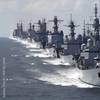MEBA Calls for Food For Peace Funding
The Marine Engineers’ Beneficial Association calls for the protection of U.S. maritime and agricultural jobs.
The Marine Engineers’ Beneficial Association (M.E.B.A.) stands with 21 U.S. Senators and its United States maritime industry partners in protecting thousands of U.S. maritime and agricultural jobs by calling for continued funding of the Food for Peace (PL 480) and Food for Progress programs. These programs, administered by the U.S. Agency for International Development, create necessary cargo for the U.S.-Flag shipping industry through the delivery of vital overseas food assistance.
Recently, M.E.B.A. learned that the Obama Administration is considering major budgetary changes to these programs, switching them from in-kind food assistance to cash grants or purchasing food from allegedly cheaper foreign suppliers for Fiscal Year 2014.
M.E.B.A. opposes a restructuring of these programs because it would endanger the jobs of 44,000 American merchant mariners, farmers, shippers, processors, and port workers whose employment are reliant on food aid.
“The U.S. civilian mariners and U.S.-flag ships that carry this food aid are the same that delivered over 90 percent of the cargo to our troops in Iraq and Afghanistan. This cargo maintains vital jobs in the maritime sector and helps sustain the U.S.-flag commercial fleet, allowing us to keep the skills needed to boost national security and to remain globally competitive in the shipping market,” said Mike Jewell, M.E.B.A. President. “Without these programs we will lose the skilled mariners and vital ships needed to support our military’s sealift capacity, and we will demolish our ability to remain viable in worldwide maritime shipping.”
Preference for national-flag ships to move national cargoes in international trade is a policy pursued by many maritime nations, and the U.S. is no different. Cargo preference laws and policies foster the economic national security priorities of the United States.
“When spending U.S. tax dollars on international food aid, the hard working American mariners and farmers should be used to the highest extent possible. It is the ‘Buy American’ version of foreign aid,” said Jewell.
Funding for The Food for Peace program has been reduced 35 percent since 2008, despite the growing need for food assistance in developing countries, the necessity of securing U.S. transportation jobs to remain globally competitive and nationally secure, and a trade surplus in the American agriculture sector that led to $108 billion of farm goods exports in 2010.
M.E.B.A. has already reached out to pro maritime legislators to seek help in keeping these vital programs funded and will continue to do so. This week, twenty-one U.S. Senators sent a letter to the White House requesting the President to reconsider his approach and maintain funding for the current programs. As the letter states, “this program has been instrumental in linking rural America and the U.S. agriculture and transportation industries to communities in the developing world while building greater awareness and support at home for the needs of the poor, hungry and disenfranchised around the world.”
M.E.B.A. will continue to work with pro maritime and pro food aid lawmakers and other leaders in the maritime and agriculture sectors to secure funding for Food for Peace and Food for Progress programs, and to protect the U.S. jobs.













